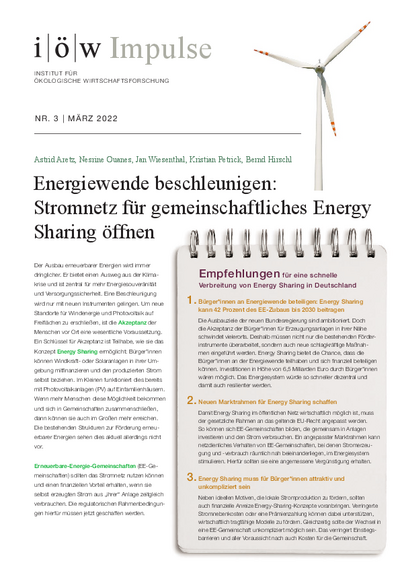Accelerating the energy transition: opening up the power grid for joint energy sharing
The expansion of renewable energies is becoming increasingly urgent. It offers a way out of the climate crisis and is central to more energy sovereignty and security of supply. However, acceleration will only succeed with new instruments. In order to develop new locations for wind energy and photovoltaics on open spaces, the acceptance of local people is an essential prerequisite. One key to acceptance is participation, as facilitated by the concept of energy sharing: citizens can co-finance wind or solar power plants in their neighbourhood and purchase the electricity produced themselves. However, the existing structures for the promotion of renewable energies currently do not facilitate this. We therefore propose that renewable energy communities should be able to use the electricity grid and receive a financial advantage if they consume self-generated electricity from "their" plant at the same time.
The regulatory framework for this must be created now.
1. Involve citizens in the energy transition: Energy sharing can contribute 42 percent of the ambitious renewable energy expansion targets by 2030
The expansion targets of the new German government are ambitious. However, the acceptance of citizens for generation plants in their vicinity is dwindling in many places. Therefore, not only the existing support instruments need to be revised, but also new powerful measures need to be introduced. Energy sharing offers the opportunity for citizens to participate in the energy transition and to contribute financially.
2. Create a new market framework for energy sharing
In order for energy sharing in the public grid to be economically feasible, the legal framework must be adapted to current EU law. This will allow renewable energy communities to form, invest in renewable energy plants and consume the electricity together. An adapted market framework can stimulate grid-serving behaviour of renewable energy communities, where electricity production and consumption are spatially close to each other, in the energy system.
3. Energy Sharing must be attractive and uncomplicated for citizens.
In addition to the idealistic motives of promoting local electricity production, financial incentives should also promote energy sharing concepts. Reduced ancillary electricity costs or a premium payment can help to promote economically viable models. At the same time, it should be easy to switch to a renewable energy community. This reduces barriers to entry and, in all likelihood, also costs for the community.



